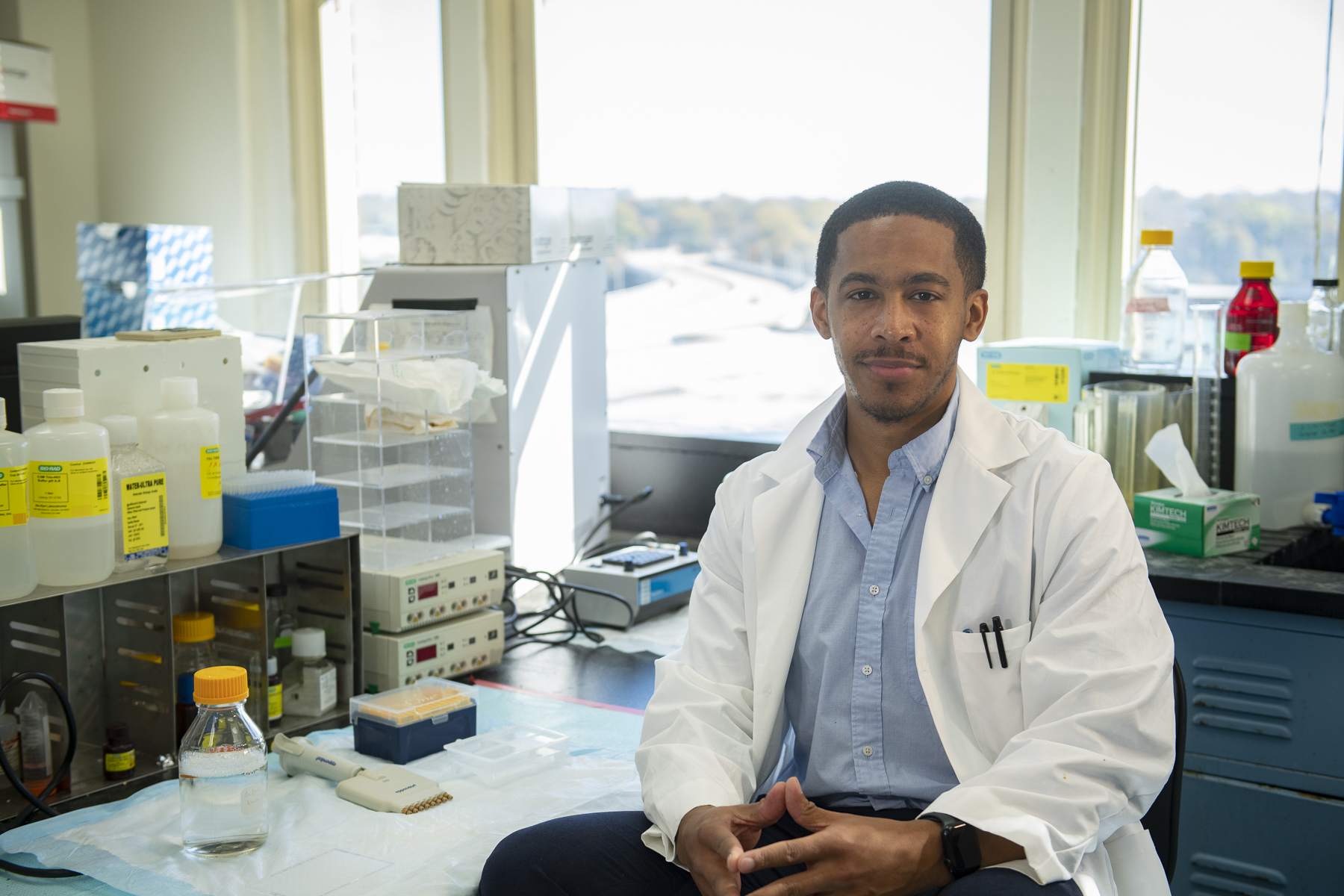A budding scientist goes to Washington
Third-year Ph.D. candidate and 2023 ASPET Washington Fellow Stanley Cheatham is eager to apply his science and policy experiences outside the lab.

Third-year Ph.D. candidate and 2023 ASPET Washington Fellow Stanley Cheatham visited Washington D.C. to learn how to help bridge the divide between science and politics. (Photo by Tom Kojcsich, VCU Enterprise Marketing and Communications)
Stanley Cheatham is a scientist, but he wants to do more than make discoveries in the lab. He also wants to advocate for stronger ties with policymakers and increased funding so that researchers across the U.S. can continue advancing science and medicine for the betterment of society.
Now a third-year Ph.D. candidate in the Department of Pharmacology and Toxicology, Cheatham is one of 10 graduate students nationwide to be named a 2023 Washington Fellow by the American Society for Pharmacology and Experimental Therapeutics (ASPET). The one-year program aims to empower early-career scientists who are interested in the intersection of science and policymaking.
Cheatham is investigating chemotherapy-induced diarrhea and why it persists in patients who have become resistant to treatment. By looking at the side effects of chemotherapeutic drugs on neurons from the gut, he hopes his research can help lead to the development of alternative treatment modalities for both cancer and the side effects of medications to treat it.
'Personal ethical pursuits in science’
Cheatham’s dedication to science advocacy is not new. As an undergrad at VCU, he co-founded the Black Men in Medicine student organization, which promotes science and medicine amongst African American males and encourages the idea of applying to medical school. He is also a mentor for the Ronald E. McNair Post-baccalaureate Achievement Program, a federally funded program that supports underrepresented students pursuing doctoral degrees.
He has explored science through academia and private industry, but since he had never seen the government’s role in science up close, he applied for the fellowship to learn how the government addresses scientific questions and how to advocate for policies within the basic sciences.
“Not only was it something new to pursue, but it was another avenue to explore personal ethical pursuits in science,” Cheatham said.
For example, he wants to see government regulations make prescriptions made more accessible and affordable for patients by shortening patent lengths for new drugs. He explained that this can be a challenge when figures in the pharmaceutical industry with an "expressed interest in profitmaking" control drug patents and block the production of cheaper, generic versions.
"A profit at the cost of the patient is not something I'm interested in," he said.
Advocacy in action
In April, Cheatham and his cohort traveled to Washington, D.C., to advocate for more federal funding for pharmacology and toxicology research. They met with congressional staffers, many of whom hold Ph.Ds. and came to Capitol Hill through American Association for the Advancement of Science (AAAS) fellowships.
“It was exciting to speak to the staffers and see a potential career as a scientist who puts his Ph.D. to work in a non-laboratory setting,” Cheatham said, noting that science advocacy is easier when lobbying other scientists, like the AAAS fellows. "Real world science is fairly unknown to the public in regard to what goes on behind the scenes."
What goes on “behind the scenes,” he said, is funding. Cheatham noted that since the start of the COVID-19 pandemic, the NIH has received nearly $4.9 billion in funding for research on diagnostic tests, vaccines and treatments.
“Funding was pushed through the roof to expediate the discovery and production of vaccines for the public,” Cheatham said. “When you dedicate adequate funding into the sciences, you can achieve great things.”
Cheatham’s mentor in the Department of Pharmacology and Toxicology, Hamid I. Akbarali, Ph.D., echoed the importance of funding. Cheatham is Akbarali’s third trainee to become a Washington Fellow since the ASPET program began in 2013.
“It’s a proud achievement from our laboratory and a great contribution from VCU towards making science policy in pharmacology a particular area of interest in the political realm,” Akbarali said. “I think Stanley has a very bright future because of his passion for what he does in both science and advocating for science.”
The fellowship concluded in May, and Cheatham has no plans of slowing down in or out of the lab. He recently wrote an op-ed for the ASPET Washington Fellowship on increasing diversity in STEM and is expected to graduate in 2025. Cheatham is also in the process of forming a chapter of the National Science Policy Network here at VCU School of Medicine, and he plans to remain active in government as it pertains to science policy.
“Whether it’s environmental concerns, drug prices, equitable patient care or research funding, you just need to get involved,” Cheatham said.